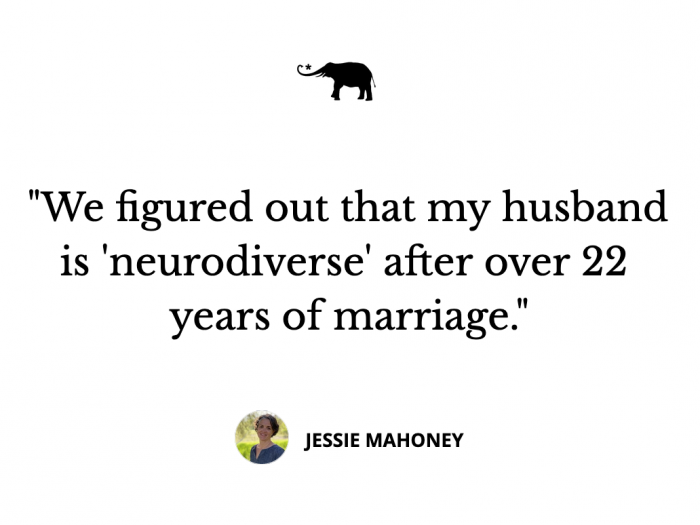Amy Schumer shared on social media last week that her husband has autism.
She also said that his “being diagnosed has helped them communicate and support each other better.”
She encouraged others not to shy away from getting this information because “the gift of information changes lives.” Information “allows people to function to the best of their abilities and remove any stigma that comes with autism.”
We figured out that my husband is “neurodiverse” after over 22 years of marriage.
We are about to celebrate 28 years of marriage. The knowledge that we have a neurodiverse relationship has been a game-changer for us. It was the “not knowing” that caused so many of our challenges and negatively impacted his mental health.
Autism may seem like a negative, but as coaching teaches you, it is merely a neutral fact.
Some days it’s a fact that feels like a heavy brick, and I wish it were different.
Other days, it feels like a gift.
It’s good and bad.
Like everything in life.
My husband sees things differently than I do.
His logic is a great balance for my emotion.
It makes him an exceptional lawyer, great in disasters, and extra-helpful with teenager issues.
His loyalty and commitment are beautiful and unwavering.
He would not intentionally do harm to anyone or anything.
He has many incredible finely-honed skills and useful strengths that result from his neurodiversity.
Because of our neurodiversity, I have had to grow in ways I didn’t know I needed or wanted to. And that growth was good. In fact, it was amazing.
It led us to a better marriage.
It led me to be a better parent and a better doctor.
It led me to yoga. It led me to mindfulness.
It led me to become a coach.
It led me to step into my current life and to pursue my dreams.
It led me to a life in which I “dance my heart.”
It led me to help others navigate the good and bad of life, especially the challenging relationships that they may not understand.
Helping others find relief, discover agency, and find love, connection, and peace again has become dear to my heart because of this journey.
I recently wrote about the necklace my husband gave me many years ago. The necklace says, “Dance Your Heart.” My husband gave it to me long before we knew anything about neurodiversity being a part of our marriage.
He saw me then and sees me now.
Just like Amy Schumer describes her husband’s devotion.
My husband is the same loving human he always has been—with or without “a label.”
He is the one I fell in love with at age 16, not knowing anything about Aspergers or autism or neurodiversity. In 1984, autism was hardly spoken about at all anywhere. Kids who did well in school despite being “different” received no support or services.
My husband’s neurodiversity is a part of our journey and our story, including all the perks and associated challenges.
It’s also part of our family’s journey.
Our kids have learned and grown in incredible ways from all of it.
Has the journey been easy? No.
But no one’s life is easy.
Even the ones that look easy are also hard.
Neurodiverse marriages are hard. But so are so many others.
What helped me most was putting down the “heavy backpack” of the story.
Stepping out of victim mode and instead choosing to look for what was working and what was actually beautiful “in the mess,” as I often say. Not to ignore or not see, but because that is what love for us both would do.
Last month was autism awareness month.
I wasn’t inspired to share about this then.
In mental health awareness month, I am inspired to do so.
Why?
Because it isn’t autism that is the issue most of the time, it is the stigma around autism and the many mental health comorbidities that go along with it that have been our biggest issue.
The mental issues are exacerbated by the challenges of being different, not understanding why, and not fitting in.
Love would be brave and share this, so others feel less alone on their journey.
Love would encourage others to search for more understanding of others and our human brains.
Love would accept and show compassion for all brains—all diagnoses and mental health issues.
Love would show up to help others in neurodiverse relationships who are looking for answers.
And love would share the tools that work in these marriages with everyone else who is struggling in their marriage because these same tools are transformational for all challenging relationships.
Love would honor our personal journey and encourage others to do the same (if and when they feel able).
By being vulnerable and truly seeing one another, we can more effectively drop the stigma of both mental health struggles and neurodiversity.
May you all extend love, acceptance, and understanding far and wide.
And in doing so, receive and enjoy more yourself.









Read 0 comments and reply